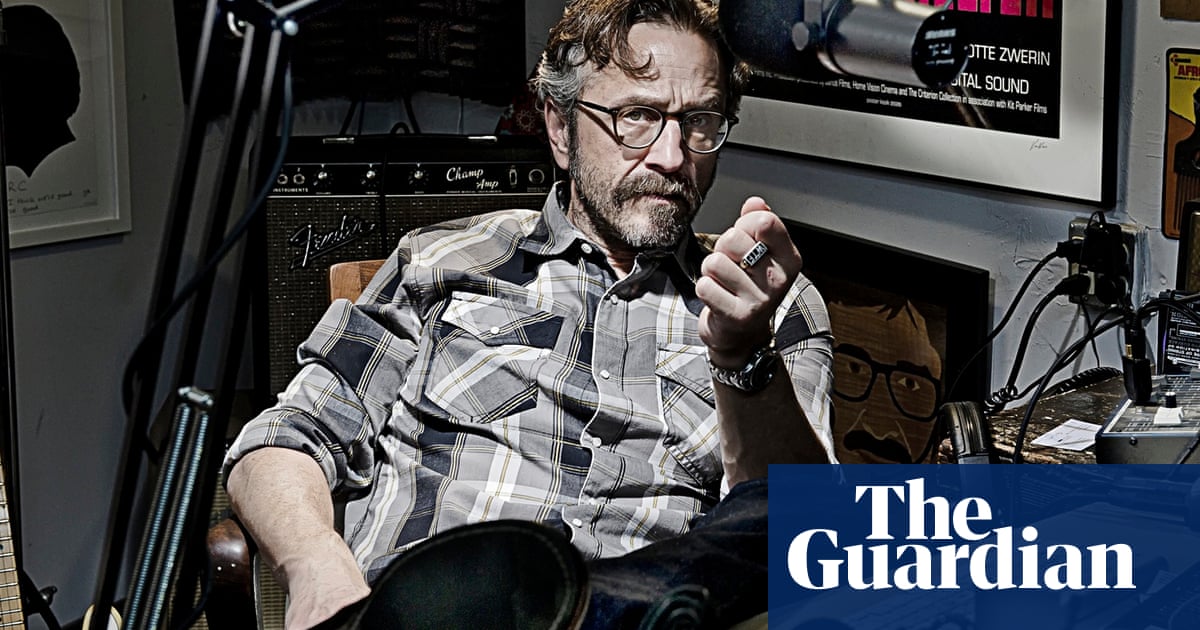It’s the end of an era: Marc Maron has announced that he’s ending his popular and influential podcast WTF with Marc Maron after nearly 16 years and more than 1,600 episodes. The final episode will be released later this year.
“Sixteen years we’ve been doing this, and we’ve decided that we had a great run,” Maron says on Monday’s episode. “Basically, it’s time, folks. It’s time. WTF is coming to an end. It’s our decision. We’ll have our final episode sometime in the fall.”
Maron says he and his producer, Brendan McDonald, are “tired” and “burnt out” but “utterly satisfied with the work we’ve done”.
When he began WTF in 2009, Maron was a veteran standup comic whose radio show on Air America had just been cancelled: he used his keycard to sneak into Air America’s studios to record the first episodes of WTF without them knowing,before setting up a studio his garage. In its earliest days, WTF was a space in which Maron aired his insecurities about his career, his divorce and worked out his feelings with fellow comedians who he felt had essentially left him behind.
But as Maron opened up more about himself – his upbringing, his struggles with drug addiction and his romantic relationships – the show became less about his cranky resentments and more about how creative people find personal fulfilment. Actors, directors and musicians began coming on more and Maron’s deceptively simple, slightly rambling interviewing style encouraged even the most famous guests to tell stories they’d not shared before.
If you have a bit of time to kill, there are more than 1,600 WTF episodes out there waiting for you (though the older ones are behind a paywall). The best ones are usually with (male) comedians (Conan O’Brien, Mel Brooks and Norm Macdonald all almost made the list); the worst ones include Courtney Love and Ben Kingsley. But here are five of the best:
1.Barack Obama(episode 613, 2015)
It had to be here. This episode arguably redefined podcasting, turning it into a serious medium that was powerful enough to lure a sitting US president to a Los Angeles garage to discuss fatherhood, racism and gun control. Just as good is the following episode, titledThe President Was Here, in which Maron and McDonald unload about the strange experience of having the secret service sweep in.
2.Robin Williams(episode 67, 2010)
This emotional 2010 interview with Williams, in which he talks about his struggles with depression, alcoholism and suicidal thoughts, was rereleased on the day of Williams’ death in 2014 with a new introduction by Maron. The episode earned a place in the National Recording Registry at the Library of Congress.
3.Louis CK(episodes 111 and 112, 2010)
Over two hours in 2010, Maron and his fellow comedian, Louis CK, famously recorded what was essentially a therapy session in which the two former friends unpicked why they had drifted apart. CK felt Maron had abandoned him during some tough times; Maron admitted his professional envy over CK’s stratospheric rise. (This was seven years beforeCK admitted to masturbating in front of women without their consent.) “You’re letting me down as a friend, by being jealous,” CK tells him. “I could’ve used you. I got divorced. I got a show cancelled … but you shut me out because you were having a hard time.”Slate called it the best podcast episode of all time; Maron himself said he didn’t think it was a great interview but said: “It helped me a lot as a person.”
4.Lynn Shelton(episode 627, 2015)
This episode marked the first time Maron met Shelton, a indie film-maker. She was married at the time and he was dating someone else but you can hear them clicking in real time in this episode; Maron is audibly charmed by her vivacity. They fell in love and stayed together until her sudden death in 2020 from a previously unidentified blood disorder, aged 54. A couple of days after her death, Maron rereleased the interview – which WTF always does when a previous guest dies. This stood out for his deeply emotional introduction in which he talked about why he loved her. “I don’t even know if I should be out in public talking,” he says, “but this is what I do.”
5.David Spade(episode 669, 2016)
Most people will know Spade as either Joe Dirt or the horny guy in Just Shoot Me but the episode is a true all-timer – partly for revealing how funny Spade is when he’s just being himself, but also for the astonishing story he tells about the time he was attacked by his personal assistant in his own home, having to bar himself in the bathroom with a shotgun. “I had him down to two days a week after that,” Spade says.
